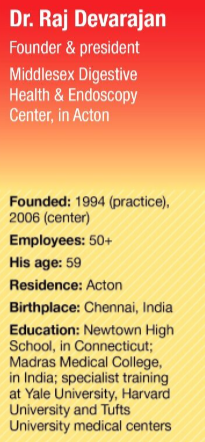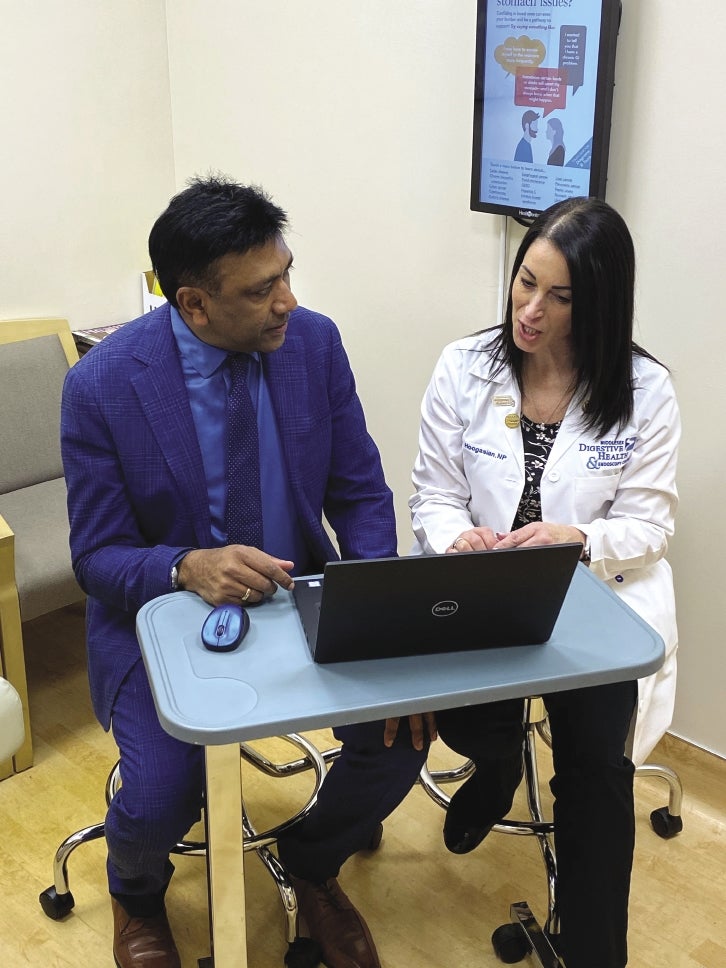In 1994, Dr. Raj Devarajan founded the practice Middlesex Digestive Gastrointestinology, and then spent the next 12 years preparing to open his own outpatient center, Middlesex Digestive Health & Endoscopy Center, fulfilling his prediction of patients seeking out more convenient and lower-cost care.
Get Instant Access to This Article
Subscribe to Worcester Business Journal and get immediate access to all of our subscriber-only content and much more.
- Critical Central Massachusetts business news updated daily.
- Immediate access to all subscriber-only content on our website.
- Bi-weekly print or digital editions of our award-winning publication.
- Special bonus issues like the WBJ Book of Lists.
- Exclusive ticket prize draws for our in-person events.
Click here to purchase a paywall bypass link for this article.
In 1994, Dr. Raj Devarajan founded the practice Middlesex Digestive Health, and then spent the next 12 years preparing to open his own outpatient center, Middlesex Digestive Health & Endoscopy Center, fulfilling his prediction of patients seeking out more convenient and lower-cost care. In May, Devarajan, who immigrated to the U.S. at age 8, opened a special weight management division.

Why did you want to open an outpatient center?
I was on the strategic planning committee at Emerson Hospital in Concord for a long time. I told them in 1995 health care is moving to lower-cost, point-of-care services for patient convenience and moving away from the expensive infrastructure of the hospital. I thought we needed to build outpatient centers everywhere.
Finally, I decided to build my own, which I did in 2006. In the rest of the country, this trend started well before 2006. Before that, the Massachusetts Hospital Association – perhaps the most powerful hospital association in the world – placed a moratorium on building outpatient centers, because they knew they would lose volume to those centers.
My center was the second-to-last GI center built in Massachusetts, and there haven’t been any new ones in the last 11-12 years.
You have grown your staff 10x from its original five. Why have you grown so much?
We’ve been growing for several reasons. Outpatient care is attractive to patients, in regards to safety, convenience and cost. We pride ourselves on having the best equipment. It is a good patient experience. When you work in a community, your main referrals are from patients. They tell their friends, family, and neighbors.
We have been growing in service lines, too. We are now a full-service GI center. We have our own infusion centers and a video-capture endoscopy unit. In May, we announced we started our own weight-loss center, Middlesex Weight Management, which has a healthy and sustainable approach to weight loss.
Has that new division been busy?
We just opened a few weeks ago, and we already have about 150 patients.
Weight management needs to become a big part of health care. Obesity is growing at such a high rate, and it has all sorts of negative implications on so many aspects of health: diabetes, heart disease, hip replacement, knee replacement, etc. We are literally spending hundreds of millions of dollars every year.
There has to be a comprehensive approach to weight management. Much of it is genetic, which many people don’t realize. We have various medications and other measures to help achieve weight loss, which will help achieve reduction in key metrics.
There are a lot of interesting things in weight management people have not taken on, and we are excited to do that.
What else makes your center stand out?
We have started our own research company. When you have thousands of patients like we do, you have people who can’t afford medications, or there are conditions where they are looking at new treatments. By being a research company, we can get some of those treatments to our patients by enrolling them in the studies for these new drugs.
How much business does your center do?
We are doing about 9,000 procedures per year. We see between 100-120 patients per day. It has grown about tenfold in the past 15 years.
There is more awareness now of how much GI impacts the other systems of the body. If you took lost worker days in the country, the biggest reason is GI. It costs hundreds of million dollars to the economy, and there is more awareness of the impact of GI illnesses.
We also have a very educated population in the area where I work, so they understand the importance of screening and staying ahead of the curve for their health.
What is next for you?
I plan to form an integrated health care delivery system in the community setting. I’m very involved in the business side and the politics of healthcare. I am president of the Massachusetts Gastroenterology Association, where we discuss the future of care. Accountable care organizations have been formed to provide integrated care for patients in order to reduce cost and provide inherent care for patients. Specialty care needs to be made a significant part of that.
This interview was conducted and edited for length and clarity by WBJ Editor Brad Kane.

